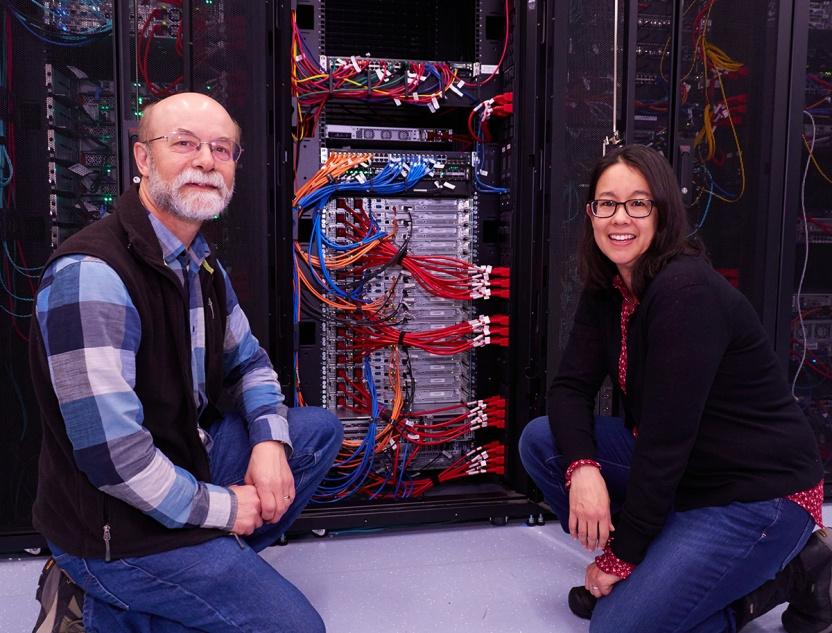Middlebury Increases Its Academic Computing Power

MIDDLEBURY, Vt. – A group of faculty members across a range of academic disciplines has received more than $150,000 in funding from the National Science Foundation to install a high-performance computing (HPC) cluster at Middlebury College.
The cluster, which has been delivered and is now being configured, is capable of analyzing large datasets and performing computational modeling in a fraction of the time that it would take any other computer, or group of computers, currently in place at Middlebury. As soon as it is fully operational, the cluster will enable faculty and students across the disciplines to perform cutting-edge research on social, environmental, and scientific issues.
The principal investigator on the project is Associate Professor Amy Yuen of the Political Science Department, who is also the director of the program in international politics and economics. Yuen and her faculty colleagues have dubbed the cluster “Ada” in honor of Ada Lovelace, the famed 19th-century English mathematician.
Yuen realized years ago that Middlebury’s computing resources were insufficient to conduct the type of instrumental variable analyses needed to advance her research into worldwide peacekeeping efforts to help resolve civil conflicts. Her work uses a vast dataset from more than 200 civil-war cease-fires, and the computational gains from the new computer cluster will reduce the time for her to run a single estimation from 20 hours to eight minutes.
The cluster itself consists of 17 computer nodes (or devices), including 14 nodes with 96GB of RAM each and one additional node with 768GB of RAM. The new HPC also has a dedicated graphics processing unit (GPU) with 96GB of RAM, along with a storage node with 60TB of hard drive storage. The 17-node cluster contains a cumulative total of 556 processors (or cores); by way of comparison, the average computer workstation contains two or four processors.
Dave Guertin, the ITS system administrator who installed the hardware, says the cluster “will easily handle computing jobs that would have been impossible before, using Middlebury’s existing computer equipment.”
The cluster is housed inside a temperature-controlled room in the College’s data center at 700 Exchange Street about two miles from campus. Installed in a rack between the servers that send and receive tens of thousands of emails a day and the servers that store terabytes (TB) of College data, the HPC is about the size of two dorm refrigerators. It looks like a stack of black metal boxes with blinking lights and colored cables, but of course the cluster is much more than that.
“In terms of data science and quantitative analysis, the HPC will be a critical tool to support research and teaching at Middlebury for years to come,” Yuen explained. “And as the College becomes more and more focused on science and technology, and as the need for bigger and faster computing capabilities grows, this cluster can grow with it.
“Middlebury’s current computing capabilities are too limited to allow faculty or students to pursue large computational projects or large data projects, and the College’s computing power will have a direct impact on teaching the next generation of researchers who already have access to large datasets [from outside sources] in multiple fields but don’t have the means to analyze them.”
The cluster will help fulfill the College’s learning goal that its students will “demonstrate skill and sophistication in quantitative reasoning,” Yuen added.
The National Science Foundation awarded Middlebury College $151,164 for the cluster, which covered the cost of the hardware along with the software needed to perform high-level computational analyses across academic departments.
An assistant professor of physics, Chris Herdman, contributed a portion of his research funds to the project. “Having access to a computer cluster with a large number of CPU cores and computer nodes with large quantities of RAM is essential for performing the numerical simulations I need to study the quantum mechanical properties of matter,” he said.
In addition to Amy Yuen and her ongoing research for a project titled “Negotiating Peacekeeping Consent: Information and Peace Outcomes,” the following faculty members and research projects are cited in the NSF grant application:
- “Survival of the Richest: How Political Campaigns Form Campaign Funding Coalitions,” Professor Bert Johnson (political science);
- “Identification of Novel Mediators of Pain in Drosophila metanogaster,” Assistant Professor Amanda Crocker (neuroscience);
- “Media Portrayals of Muslims: A Comparative Sentiment Analysis of American Newspapers, 1996–2015,” Professor Erik Bleich (political science);
- “Trade and Agricultural Technology Adoption: Evidence from Africa,” Assistant Professor Obie Porteous (economics);
- “Unemployment Composition and Aggregate Dynamics,” Assistant Professor David Munro (economics);
- “Non-parametric Genotyping of Structural Variants in Whole Genome Sequencing Data,” Assistant Professor Michael Linderman (computer science); and
- “Metagenomic and Metatranscriptomic Assembly and Analysis of Microbial Communities,” Assistant Professor Erin Eggleston (biology).
The computer cluster, which is referred to informally as a “supercomputer,” will also have applications in the undergraduate curriculum in courses such as Frontiers in Political Science Research, Microbiology, and Molecular Microbiology. In addition, new courses in computer science are envisioned—courses that will require greater computing capacity than that which previously existed at Middlebury.
By Robert Keren; Photo by Todd Balfour

